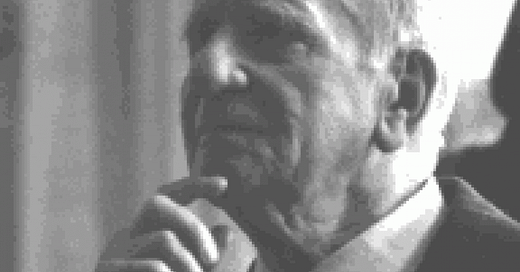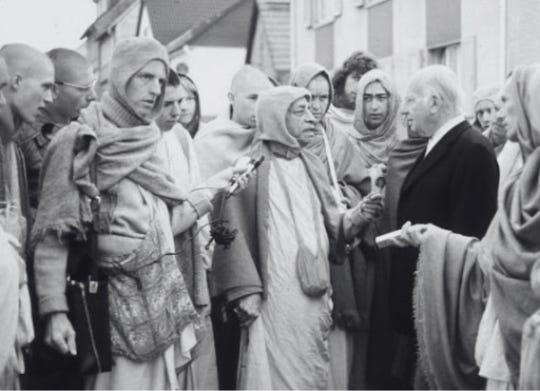When the war was lost, Dürckheim’s vision for Germany’s ideal future became impossible. His hopes for German power and perfection regressed from possibility into dreams. The race soul had not guided his people to a revival; it had led them to death. Afraid that his own beliefs would bring about his demise, Dürckheim started to develop a new commitment for which he was ready to die.
First Dürckheim abandoned his faith in his racial, group ideal, and substituted for it a new belief in the individual and the universal. As a Nazi, he thought that each racial group must work to manifest its group ideal and achieve perfection. But now, Dürckheim believed every person had to work alone to manifest their own perfection. By freely choosing the activity that was right for them, they could unfold themselves to their maximum possibility. Doing so they would not encounter their race soul, but what he called our ‘Divine Being,’ a revitalising force he thought animated all living things, and whose powers could help us lead free and responsible lives, and uphold our society’s values and traditions. The authority of Divine Being, he believed, was good, and we should subordinate ourselves to it absolutely.
In prison, and at a moment politically convenient for himself, Dürckheim abandoned his faith in racial group perfection. Fearing punishment and death, and after a great personal trauma, he threw himself into thought and became interested in liberal individualism and ideas that had ‘absolute validity for all men.’ In his own words, he was transformed. He convinced the denazification courts of this too, for they released this decorated Nazi from prison with only a trivial punishment: a small fine, and a declaration that he was a fellow traveller of Hitler’s regime.
After he left prison, Dürckheim was no longer a Nazi. With his freedom, he drew on his knowledge of Zen, Christianity, and Jungian psychoanalysis to develop a new system of spiritual therapy, and to write books like The Way of Transformation that promoted his ideas. For the rest of his life, he laboured tirelessly on his new ideas once more. And by the time of his death in 1988, Dürckheim had become a spiritual leader with a devoted following, and was recognised as an important contributor to the rise of Eastern religion in the West.
Today Dürckheim’s followers remember him as ‘a beacon for humanity’, a revolutionary dispenser of ‘life-giving wisdom.’ Yet his revolution may not have been radical as he thought. It is true that Dürckheim abandoned his overt racism; he exchanged his Nazi beliefs for liberal individualism. At the same time, though, the underlying structure of his beliefs did not change. Both as a Nazi and as a liberal, he thought humans were beholden to an idea of a perfect future, and that it was our duty to manifest it in the world. He believed we begin in a place of lack and insufficiency, and that we must strive and work to achieve identity with our vision of an idealised tomorrow.
Throughout his life, Dürckheim believed in potential and work above all else. Like Nazis, like today’s liberals, he was forever beholden to possibility, to ambition, to the narcissistic perfection of the self, and implicitly condemned the present with his belief in a better tomorrow. His beliefs during and after the war diverged not on the level of form, but content: on whether today could be rectified with an idealised future for individuals or for groups. Self-actualisation or collective-actualisation.
Given their structural similarity, Dürckheim’s transition from Nazi to liberal must give us pause. Perhaps his ideological transition was possible not because he had radically changed, but because fascism and liberal individualism are linked in a disturbing way. Because, on a fundamental level, they are the same. Because, with their narcissistic fixation on the self and its potential, they mirror each other.
And maybe Dürckheim’s transformation did not come from a revelation of insight, but from a mind threatened by death and dissolution. Maybe he first became a Nazi and then a liberal, and clung to thoughts of an ideal tomorrow, to protect himself against the uncertainties and terrors of the present: against a collapse that left him without ground for his beliefs.
References
Baier, K. (2013) The Formation and Principles of Count Dürckheim’s Nazi Worldview and his Interpretation of Japanese Spirit and Zen. The Asia-Pacific Journal, 11(48), pp.1-33.
Goettmann, A. (1998) Dialogue on the Path of Initiation: The Life and Thought of Karlfried Graf Dürckheim. Nottingham Publishing.
Goettmann, A., & Goettmann, R. (Eds.) (1998) Becoming Real: Essays on the Teachings of a Master. Nottingham Publishing.
Haffner, S. (2014) Defying Hitler: A Memoir. Lexington, MA, Plunkett Lake Press.
Joachim-Bieber, H. (2015) Zen and War: A Commentary on Brian Victoria and Karl Baier’s Analysis of Daisetz Suzuki and Count Dürckheim. The Asia-Pacific Journal, 13(20), pp.1-15.
Victoria, B. (2013) A Zen Nazi in Wartime Japan: Count Dürckheim and his Sources: D.T. Suzuki, Yasutani Haku’un and Eugen Herrigel. The Asia-Pacific Journal, 12(3), pp.1-52.
Wehr, G. (1997) Karlfried Graf Dürckheim: Une vie sous la signe de la transformation. Paris, Éditions Albin Michel.







